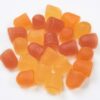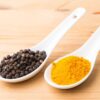Use Turmeric For Allergies (Both For Seasonal & Skin)
- Posted on
 Taiba Tariq
Taiba Tariq- Categories: Turmeric Nutrition

In the blog post “TURMERIC FOR ALLERGIES,” You’ll find the following:
- What are Seasonal Allergies?
- Turmeric’s Potential to Cure Allergies
- Ways to Use Turmeric for treating seasonal & Skin Allergies
- Safety Measures while consuming turmeric for Allergies
WHAT ARE SEASONAL ALLERGIES?
” Hay fever” or seasonal allergic rhinitis happens during certain times of the year when trees, grasses, and weeds free mini pollens into the air to fertilize plants.
These allergies develop when the body’s immune system alarms something irritating in the environment during spring, summer, or fall.
Sources of seasonal allergies: The particles in the air which cause allergy are called Allergens.
The particles in the air which cause allergy are called Allergens.
Spring Allergens: Trees, Grass Pollen, Weed Pollen
Summer Allergy Season: Grass Pollen, Fungus Spores, Mold
Fall & Winter Allergens: Weed Pollen, Mold, Dust
Symptoms:
- Congestion and nasal stuffiness
- Coughing
- Fatigue & Headache
- Itchy throat, nose, and eyes
- Runny nose and sneezing
- Sinus pressure around the nose and cheeks
- Sore throat aggravated by mucus
TURMERIC’S POTENTIAL FOR TREATING ALLERGIES
Turmeric is a spice gaining attention in the West for its potential to reduce inflammation. Curcumin is an active compound in turmeric, having anti-inflammatory qualities and anti-allergic contents.
“Studies over animals have illustrated inhibition of an allergic response in rats treated with curcumin.” Another 2016 published study indicated development in nasal airflow passage and a positive impact on immune response in allergic rhinitis patients who took curcumin.
Turmeric can be taken in
Oral consumption commonly follows three methods:
- Pills or Supplements
- Teas or Milk
- Cooking spice in curries, fries, or salads.
WAYS TO USE TURMERIC FOR CURING ALLERGIES
WHO (wing on food additives) determined that curcumin’s dietary intake should be 1.4mg per pound (3mg/kg) per day. For instance, a person weighing about 175 lbs (80kg) would need to take 245mg of curcumin daily.
- Make sure to use organic turmeric if you want to reap beneficial results.
- Remember, dosage may vary depending on the purpose of consumption.
- Consuming curcumin with fats ensures better absorption.
Here are three reliable beverages you can take to kick out seasonal allergies.
TURMERIC MILK
Turmeric milk is excellent for awful colds, coughs, stuffy noses, hay fever, and sore throat (pharyngitis). And if Turmeric Milk is taken daily, it’ll start boosting your immunity. Both milk and turmeric are antioxidants in nature, thus strengthening bones. So combined with Turmeric, it provides additional benefits to bone sustainability.
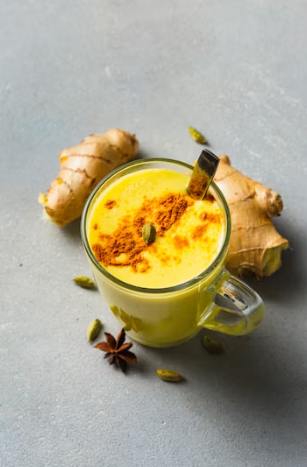
You can have a cup of Golden Turmeric Milk before breakfast and bedtime, which will induce sound sleep, aid in breaking down accumulated abdominal fat, and helps in weight loss.
Note: Raw honey commonly has pollen grains, causing an allergic reaction. Regular or processed honey doesn’t have pollens. If you have an allergy to pollens, don’t use raw honey.
TURMERIC HONEY TEA
Turmeric tea can treat Rhinitis (hay fever). Curcumin can help control nasal congestion, sneezing, itchy throat, nose, and sinus pressure around the nose and cheeks. Honey has been studied as a cough suppressant and may have anti-inflammatory effects. Honey has been reported to decrease symptoms in people suffering from seasonal allergies.
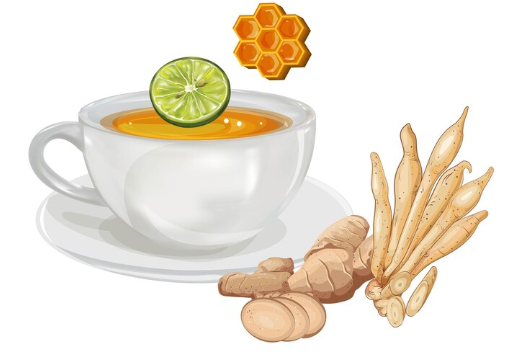
Required Ingredients
- Water or milk
- Turmeric
- Cinnamon
- Honey or any other flavoring
- Black pepper
Directions
- Add a cup of water or milk to a pan, and allow it to boil.
- Into a cup/glass, add 1/2 teaspoon of Turmeric.
- Mix all the other desired ingredients in boiling milk or water.
- Keep it on the stove for 10 minutes. Serve and enjoy!
NOTES/TIPS
- Mix well all ingredients and allow it to steep for about 10 mins, then have it, but make sure you give it a stir once or twice before drinking. Little sediments will be left at the bottom.
- Use a measuring spoon to measure the ingredients.
- Have this drink on an empty stomach in the morning; for best results, have one cup at bedtime.
- Have breakfast after 30-40 mins of this drink.
- Use locally available ingredients for best results.
TURMERIC GINGER TEA
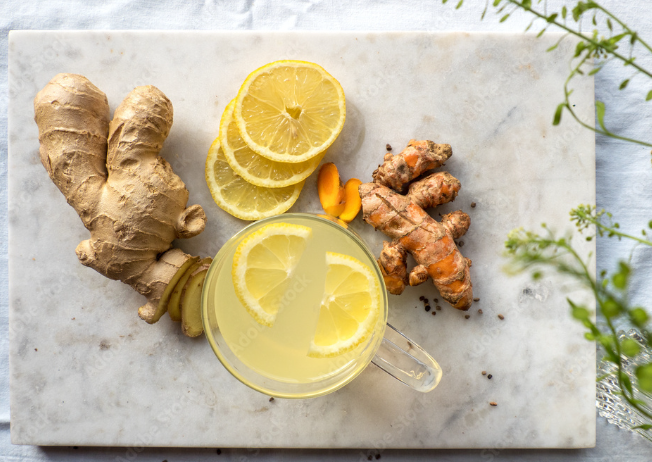
Many unpleasant allergic symptoms come from inflammatory issues, like swelling and irritation in the nasal passages, eyes, and throat. Ginger can help fix these symptoms naturally.
INGREDIENTS:
Turmeric powder: ½ tsp. (half teaspoon)
Ginger Juice: ½ tsp.
Pepper powder: a pinch of black pepper
Lemon Juice: ½ tsp
Directions:
Pour all the above-mentioned ingredients into a cup (120ml) of hot boiling water. Stir it up, and enjoy!
Note: Have this mind booster tea on an empty stomach. Make sure to have breakfast after 40 minutes.
TURMERIC FOR SKIN ALLERGIES
1. HONEY WITH TURMERIC ESSENTIAL OIL
Turmeric has antibacterial, antiviral, and anti-inflammatory qualities that can battle asthma and other allergic reactions. It may help combat rashes.
Procedure
- Mix one teaspoon of turmeric essential oil with 2 tbsp. of honey.
- Spread it over the affected areas for at least 30 minutes.
- Wash it off.
- Once a day before taking a bath.
2. Turmeric Soothing Paste For Allergies
Chilled milk (or chilled water) leaves a soothing effect on the skin. Further, the anti-inflammatory properties of turmeric can help settle skin allergies and ensure skin health.
Procedure
- Mix the 1/2 teaspoon of turmeric and a few drops of chilled milk to form a paste.
- Apply it to the affected areas. Leave it on for 30 minutes.
- Remove it with lukewarm water.
- Once a day before taking a bath.
3. Turmeric & Sandalwood Paste
Sandalwood oil has antiseptic, astringent, antiviral, and anti-inflammatory properties that can help reduce skin allergies. This powder can also calm allergic skin reactions along with turmeric.
Procedure
- Mix one teaspoon of red sandalwood and one teaspoon of organic turmeric powder with lukewarm water to make a paste.
- Apply this soft paste to the affected areas for at least 30 minutes.
- Rinse with lukewarm water.
- Use twice a day.
SAFETY MEASURES WHILE CONSUMING TURMERIC FOR ALLERGIES
This is how you should treat your seasonal allergies while keeping in view the safety measures:
Reduce your exposure to allergens and their impact of them.
- Stay inside on dry, windy days when the pollen count may be high.
- Wash clothes and shower after being outside to rinse off allergens
- Closing doors and windows at night
- Operate an air conditioner at home and in your car – a HEPA (high-efficiency particulate air) filter. This filter can remove approximately 99.97{34cea586b088e0fd38e818617229a3e2b6cc2afe33580d7d159a9fdadf46af5c} dust, pollen, mold, bacteria, and any airborne particles with a size of 0.3 microns (µm).
- Suppose you are allergic to turmeric or curcumin, avoid turmeric as a whole.
- Never use more than the prescribed amount of turmeric.
- Never self-medicate. Talk to your health expert or a nutritionist first and bother their advice over dietary supplements.
- Be careful with turmeric intake.
- While applying turmeric, be wary of possible stains. Consider using gloves during application.
- Oral consumption of turmeric may result in nausea, dizziness, and diarrhea in some people.
- Never intake a large dosage of turmeric. It is said to cause abnormal heartbeat.
- Patients with gallbladder issues should avoid using turmeric.
- If you have experienced any surgery, turmeric might slow the blood clotting process.
So avoid using it now.
SOURCES
Chaudhari SP, Tam AY, Barr JA. Curcumin: A Contact Allergen. https://www.ncbi.nlm.nih.gov/pmc/articles/PMC4689497/ J Clin Aesthet Dermatol. 2015 Nov;8(11):43-8. PMID: 26705440; PMCID: PMC4689497.
Therapeutic potency of curcumin for allergic diseases: A focus on immunomodulatory actions https://doi.org/10.1016/j.biopha.2022.113646
Wu S, Xiao D. Effect of curcumin on nasal symptoms and airflow in patients with perennial allergic rhinitis.https://pubmed.ncbi.nlm.nih.gov/27789120/ Ann Allergy Asthma Immunol. 2016 Dec;117(6):697-702.e1. doi: 10.1016/j.anai.2016.09.427. Epub 2016 Oct 24. PMID: 27789120.
Crude Turmeric Extract Improves the Suppressive Effects of Lactobacillus rhamnosus GG on Allergic Inflammation in a Murine Model of House Dust Mite-Induced Asthma https://doi.org/10.3389/fimmu.2020.01092
Shin HS, See HJ, Jung SY, Choi DW, Kwon DA, Bae MJ, Sung KS, Shon DH. Turmeric (Curcuma longa) attenuates food allergy symptoms by regulating type 1/type 2 helper T cells (Th1/Th2) balance in a mouse model of food allergy. https://pubmed.ncbi.nlm.nih.gov/26342520/ J Ethnopharmacol. 2015 Dec 4;175:21-9. doi: 10.1016/j.jep.2015.08.038. Epub 2015 Sep 2. PMID: 26342520.
Li X, Lu Y, Jin Y, Son JK, Lee SH, Chang HW. Curcumin inhibits the activation of immunoglobulin e-mediated mast cells and passive systemic anaphylaxis in mice by reducing serum eicosanoid and histamine levels. https://www.ncbi.nlm.nih.gov/pmc/articles/PMC3936421/ Biomol Ther (Seoul). 2014 Jan;22(1):27-34. doi: 10.4062/biomolther.2013.092. PMID: 24596618; PMCID: PMC3936421.
Taiba Tariq
Taiba Tariq is a healthcare nutrition hobbyist, enthusiastic about researching healthcare & skincare news while analyzing the latest and science-backed evidence about nutrition, skin care, and supplements. She wants to help people regain their beauty, health, and well-being through natural means.
all author posts
